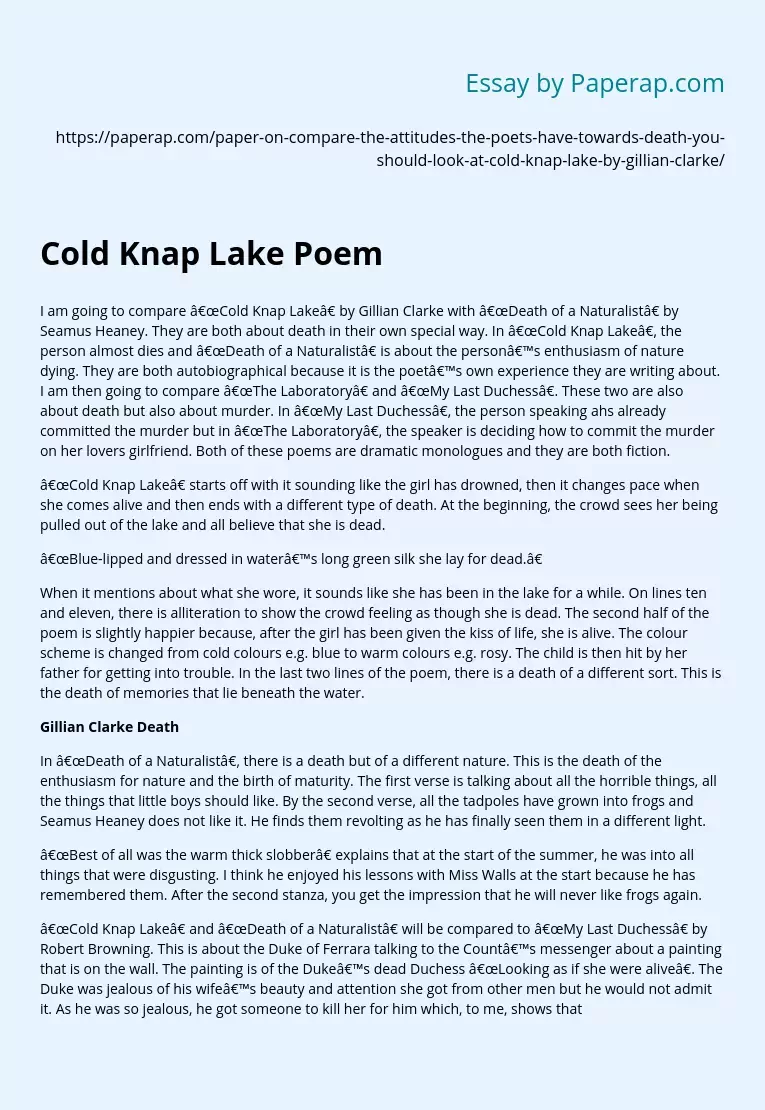Cold Knap Lake Poem vs Death of a Naturalist
I am going to compare “Cold Knap Lake” by Gillian Clarke with “Death of a Naturalist” by Seamus Heaney. They are both about death in their own special way. In “Cold Knap Lake”, the person almost dies and “Death of a Naturalist” is about the person’s enthusiasm of nature dying. They are both autobiographical because it is the poet’s own experience they are writing about. I am then going to compare “The Laboratory” and “My Last Duchess”. These two are also about death but also about murder.
In “My Last Duchess”, the person speaking ahs already committed the murder but in “The Laboratory”, the speaker is deciding how to commit the murder on her lovers girlfriend. Both of these poems are dramatic monologues and they are both fiction.
“Cold Knap Lake” starts off with it sounding like the girl has drowned, then it changes pace when she comes alive and then ends with a different type of death. At the beginning, the crowd sees her being pulled out of the lake and all believe that she is dead.
“Blue-lipped and dressed in water’s long green silk she lay for dead.”
When it mentions about what she wore, it sounds like she has been in the lake for a while. On lines ten and eleven, there is alliteration to show the crowd feeling as though she is dead. The second half of the poem is slightly happier because, after the girl has been given the kiss of life, she is alive.
The colour scheme is changed from cold colours e.g. blue to warm colours e.g. rosy. The child is then hit by her father for getting into trouble. In the last two lines of the poem, there is a death of a different sort. This is the death of memories that lie beneath the water.
Gillian Clarke Death of a Naturalist
In “Death of a Naturalist”, there is a death but of a different nature. This is the death of the enthusiasm for nature and the birth of maturity. The first verse is talking about all the horrible things, all the things that little boys should like. By the second verse, all the tadpoles have grown into frogs and Seamus Heaney does not like it. He finds them revolting as he has finally seen them in a different light.
“Best of all was the warm thick slobber” explains that at the start of the summer, he was into all things that were disgusting. I think he enjoyed his lessons with Miss Walls at the start because he has remembered them. After the second stanza, you get the impression that he will never like frogs again.
“Cold Knap Lake” and “Death of a Naturalist” will be compared to “My Last Duchess” by Robert Browning. This is about the Duke of Ferrara talking to the Count’s messenger about a painting that is on the wall. The painting is of the Duke’s dead Duchess “Looking as if she were alive”. The Duke was jealous of his wife’s beauty and attention she got from other men but he would not admit it. As he was so jealous, he got someone to kill her for him which, to me, shows that he is gutless. “The Laboratory”, also by Browning, is also about murder. This murder, however, has not yet taken place. It is very obvious from the start of the poem that she is planning murder whereas in “My Last Duchess”, you have to search for hints that the Duchess has been killed. Both the poems are dramatic monologues which means that there is only one person talking throughout the poem. In “The Laboratory”, you start to feel sorry for the girl as you know that she wants to poison the girl that her lover has fallen for. This is also about jealousy, yet this girl has admitted it. As they are both fiction, you know that they are not autobiographical.
My favourite poem out of the four has to be “The Laboratory”. This is because, of all the beautiful descriptions of the potions:
“soft phial, the exquisite blue.”
“gold oozings come”
“sure to taste sweetly, – is that poison too?”
all three of these descriptions sound like something from the Harry Potter books as they sound all magical and mysterious as you wonder if they are poisons or love potions.
Cold Knap Lake Poem vs Death of a Naturalist. (2019, Dec 05). Retrieved from https://paperap.com/paper-on-compare-the-attitudes-the-poets-have-towards-death-you-should-look-at-cold-knap-lake-by-gillian-clarke/

